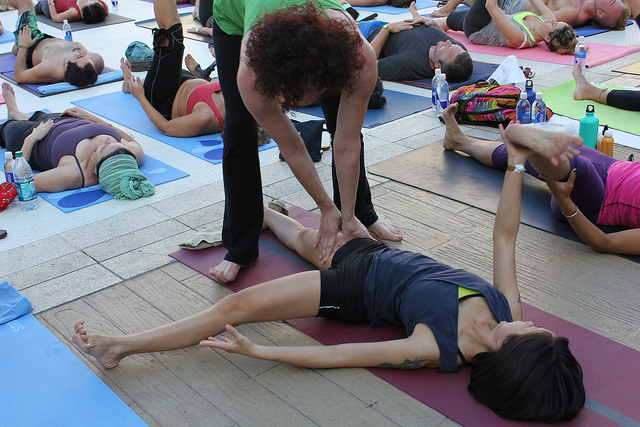
It used to be that everyone just taught yoga: inherently therapeutic, potently spiritual, definitely life changing. Then, a few decades ago, the concept of yoga as a therapy took hold and yoga teacher trainings with a therapeutic focus became a fairly common offering.
Currently, two organizations define the standards of training for yoga in the West. Yoga Alliance (YA) developed standards for yoga teacher training schools (RYS) and provides a registry for yoga teachers (RYT) who complete those programs. The International Association of Yoga Therapists (IAYT) defined the scope of yoga therapy and in the last two years, standardized Yoga Therapy education requirements. Neither organization has legal power. Members voluntarily pay dues and adhere to their standards.
In 2016, Yoga Alliance made the bold move of adopting a policy, which they are apparently enforcing, requiring that their community of RYT (registered yoga teacher) and RYS (registered yoga school) no longer use terms such as therapy, healing, medicine, etc. These words are no longer permitted on the YA website where schools and teachers have member pages describing their services. Additionally, these terms are generally not permitted on advertising materials if the YA name or logo is also present. Violators of the new policy will apparently receive a letter from the YA lawyer and their membership will be revoked.
There is a lot of anger and disappointment coming from teachers and school over this policy. I have spent some time contemplating this subject and have come to the conclusion that YA separating themselves from yoga therapy is likely in the long term a very good thing.
Just for some background, I am a yoga therapist and a yoga teacher. I am the founder of Kula Kamala Foundation, five hospital and mental health based yoga therapy programs, author of six yoga training programs (200, 300, 870, and three specialties). I have a PhD in Anthropology (Biological Archaeology) and am working toward my second doctorate, this one in Ministry. The 870 hours yoga therapy program I authored is one of the programs currently accredited by IAYT.
Teaching yoga and yoga therapy are not the same thing. Most practitioners understand that yoga is inherently therapeutic. And I doubt that anyone would try to argue that point. But that does not mean that everybody should be applying yoga as therapy.
If you go to a fitness instructor you expect to receive a fitness session. If you go to see a physical therapist you expect something different. I am not likening yoga teachers to fitness instructors by any means, what I am saying is there is a different level of expectation associated with sessions. One should be able to keep their students safe in a public environment where the students are generally healthy. The other should be able to mindfully guide an individual or a group toward an elevated experience of wellness, balance and self acceptance in the face of injury, disease, discomfort and pain.
In yoga, both the teacher and the yoga therapist are using mindfulness-based practices as the key to the individual’s well-being, but the yoga therapist is utilizing a special set of tools that is grounded in a deeper understanding in the cause and effect relationships that surround pathology, and therefore are expected to have a higher level of education in these subjects.
I feel that the current upset stems from the feeling that yoga should be a free-for-all, an independent spiritual practice. I agree but only when you are addressing your own needs. The moment you begin imposing your opinions, beliefs, and understandings on the experience of another, then you should be held to a higher standard.
Thinking back to the more traditional practices in India the student did not become a teacher until they had the permission of their teacher. That permission was only granted after a student expressed a great level of understanding.
Nowadays we have 200 hour trainings that do not even require 200 hours of instructions and we have loosely affiliated programs utilizing teachers that are fresh out of training as their “experienced” instructors. Where is the criteria for education coming in and can we see the danger, and the karma that is involved in all of this? As yogis one of our main concerns should be causing no harm, and another should be resolving karma not acquiring it. Yoga is union and harmful tendencies inhibit that experience.
In yoga therapy we are addressing individuals who have special needs. Definitely not an environment for the brand-new un- or under-supervised teacher who has yet to understand that there is a significant difference between yoga as a therapeutic mindfulness practice and yoga as a psycho-spiritual scientific therapy. Both are spiritual. Both deserve respect. Both should be taken seriously.
I do see part of the problem as being how caught up in the romance of spirituality we have become. That we think being spiritual gives us permissions that it in fact doesn’t. I am a spiritualist and I adhere strongly to the spiritual teachings of yoga. Much of my free time is spent studying. yoga does not preach conversion based “sharing,” it expresses the importance of sangha (like-minded community). Yet what we find and why YA’s position is potentially a good thing, is that many warm-hearted and well-intended teachers want to fix others and have little understanding or respect for the individuated yet unified path we walk in this life.
If I suggest that your primary job as a teacher and as a therapist is to be a witness, many would cringe because there isn’t enough involvement there to keep the ego happy. If I suggest that your “other” primary job as a teacher and as yoga therapist is to offer mindful and meaningful resources and then accept that your client may never use them, many would be hard pressed to accept that and would feel it somehow reflected their own success or failure. It takes time and experience and study to even begin to move past that, and other tendencies.
Being spiritual is a gift we are all given and it is one that comes with great responsibility. Love is a great responsibility. Yoga is a great responsibility. Karma is a great responsibility.
YA’s motive may be questionable, but it does give us the opportunity to pause and reflect.
I do not mean to sound harsh or to sound as if I am undermining anyone’s abilities. I am only speaking from a place of deep concern and from a place of experience.
I do feel that the International Association of Yoga Therapists is providing mindful standards for the training of tomorrow’s yoga therapists, which is something that is simply not included in Yoga Alliance offerings. They do not wish to be affiliated with Yoga Therapy because therapy is not their focus. I agree with them on that point and because I feel there is a much bigger picture, I am not concerned about their motivation any longer. Mostly because they are not the “be all and end all” of yoga.
As my guru, who is a life long yogi and a monk from India has asked me “who exactly are they?” They are a registry and an organization that takes your student or school membership fees and then lets you teach almost whatever you want to… for years they have provided little to no follow up to ensure that schools and their instructors where actually teaching in line with their submitted syllabi. They rarely enforced their “standards.” Today is apparently a new day.
Many are suggesting that YA is reacting out of fear, afraid of the tendencies of our overly litigious society. I don’t agree. It is my opinion that they wish to separate the work they do from the work of IAYT (International Association of Yoga Therapists). They may have concerns about legalities, but I also recognize that their primary motive is likely commercial/corporate in nature, oriented toward protecting their role as a registry with member perks, and then additionally, with not “appearing” to be more than what they actually are.
Also, Yoga Alliance can only speak to what you post on their website and in association with their corporate name. They cannot regulate what you write on your own website in the absence of any association with their name. So the statement that YA is telling you what you can and can not include on your website or social media is an incomplete explanation and a misunderstanding. Worse case scenario, if you have “Yoga therapy” or one of the other “words” and YA both listed on the same page of your website, you just need to acknowledge where that education/experience comes from and that it doesn’t come from your affiliation with YA. Don’t you want to do that anyway? Isn’t that good information for your clients so they can feel safe and at ease with you?
The last thing that I will say (for now) is that while it is an inconvenience for teachers and schools to have to rewrite our YA biographies, it might be seen as a call to satya, or truthfulness, or maybe just an opportunity to write a better bio.
Taking a good close look at how we represent ourselves to the public, to students, to each other, and to ourselves is a very good idea. It is Svadyaya after all.
Please note: if you are looking to enter the field of yoga therapy then get educated appropriately. If you were the one in need of services you would hopefully not settle for less, why should anyone else? Be educated. Be compassionate. Be yoga. Be your dharma. Be.
~
Author: Sudha Allitt
Editor: Katarina Tavčar
Photo: Cosmopolitan of Las Vegan/Flickr
Ready to join?
Hey, thanks so much for reading! Elephant offers 1 article every month for free.
If you want more, grab a subscription for unlimited reads for $5/year (normally, it's $108/year, and the discount ends soon).
And clearly you appreciate mindfulness with a sense of humor and integrity! Why not join the Elephant community, become an Elephriend?
Your investment will help Elephant Journal invest in our editors and writers who promote your values to create the change you want to see in your world!
Already have an account? Log in.
Ready to join?
Hey, thanks so much for reading! Elephant offers 1 article every month for free.
If you want more, grab a subscription for unlimited reads for $5/year (normally, it's $108/year, and the discount ends soon).
And clearly you appreciate mindfulness with a sense of humor and integrity! Why not join the Elephant community, become an Elephriend?
Your investment will help Elephant Journal invest in our editors and writers who promote your values to create the change you want to see in your world!
Already have an account? Log in.
 Share on bsky
Share on bsky





Read 13 comments and reply